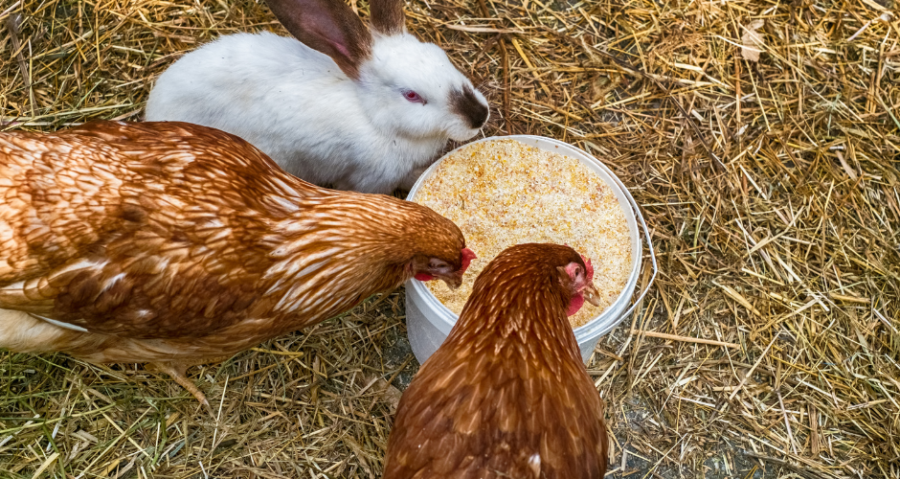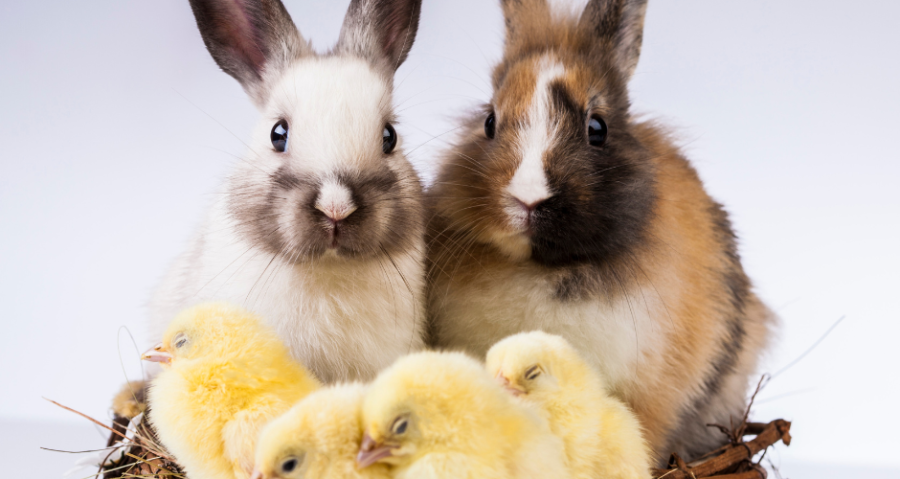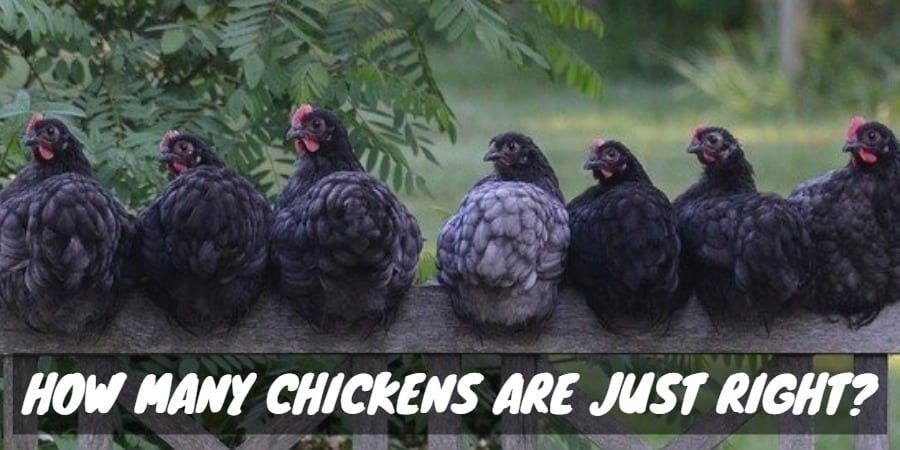Chicks and rabbits living harmoniously sounds like a wonderful Easter dream. But, is it attainable or safe for the backyard chicken tender?
The quick answer is … it depends.
While chickens and rabbits share a lot of amiable characteristics, there are some considerations one should ponder if they are planning on housing the two lovable creatures together.
Chickens and Rabbits: Benefits of Cohabitation
There are many homesteaders that successfully have chickens and rabbits living together and swear that the benefits of cohabitation outweigh the potential risks, especially with proper care and management.
Compatible Housing Needs: Save Space and Money!
Commercial rabbit hutches and mini chicken coops share a lot of convenient features which begs the question, can the two live harmoniously together?
If you’ve ever googled a rabbit hutch or looked into buying a prefabricated chicken coop, you’ve probably noticed that the two micro options share a number of similar features.
Both have sleeping quarters, exercise yards, and are predator proof. And, since chickens and rabbits have common predators, it makes sense that if one is secure enough for a chicken, it would be secure enough for a rabbit.
Looking at them, from a 20,000 foot perspective, they are virtually the same. In fact, I’ve know people who loved the look of a commercial rabbit hutch and decided to modify it slightly to house her small bantam flock (and vice versa).
**One caution I have with prefabricated or commercial coops, and this goes for any situation in which you have an enclosed run, predator proofing is also required for the floor.
Many predators will dig under the walls to gain access to the enclosed animals. For more details on chicken coops check our post The Chicken Coop: Complete Guide for Beginners
If you do plan on housing your chickens and rabbits together to save space on your homestead or in your backyard, as well as cut down on the cost, it is recommended that both animals have their own space to retire to.
Commercial housing tends to be build on an as needed basis, the most compact product for the maximum number of chickens or rabbits.
Thus, while it may be possible to share an enclosed run and reduce duplication of “security” measures, physical housing in a small space may not be practical for both animals.
That being said, if you have a large chicken coop with roosting high and out of the way, having rabbit roommates in the lower areas of the coop, away from any falling focal matter, would work.
Social Creatures Stick Together
Every chicken tender knows that you cannot simply have ONE hen. Chicken math aside, chickens are social creatures and thrive with companionship.
Rabbits are much the same.
Rabbits do well to be included in a fluffle, or a colony.
Because both creatures are social, intermingling rabbits and chickens can add variety to their day and much needed interaction.
Chickens and Rabbits: Risks to Consider
While housing chickens and rabbits together may make sense from an eco-footprint and economic perspective, there are some very real considerations when weighing the options of cohabitation.

Aggression
If you’ve had chickens for any length of time you probably know what I’m talking about.
Chickens can be aggressive.
Certainly roosters are known aggressors, ask any child who has a backyard flock.
If you haven’t taken off running through your backyard while a rooster chased you at mock 10 speed, you haven’t LIVED!
Chickens, while commonly thought of as prey animals, are actually closely related to airborne raptors.
Being omnivores, chickens will eat bugs, slugs, grubs, toads, snakes, mice and – while they wouldn’t tempt fate attacking a full grown rabbit, they have been known to eat kits and adolescent bunnies.
Aggression also plays a factor in pecking order. Chickens will mount and assert dominance in a flock to maintain order and peace amongst its members (even without the presence of a rooster).
A chicken could mount a rabbit to assert it position as leader of the flock.
Poop: Mess and Disease
While rabbits have relatively clean stool, the same cannot be said for chicken poop.
Chicken poop is messy!
Not only that, chickens are frequent poopers and cannot be trained to use a litter box (as a rabbit can), or even hold it for very long.
While messy poop may not be a problem for skin footed featherheads, it is another story entirely for fluffy footed friends.
Chicken poop can wreak havoc on a rabbits overall hygiene. From matted fur to parasite infections and hairballs from constant grooming.
Certainly, the mess of waste should be considered when housing chickens and rabbits together.
While we are on the topic of poop … we should mention that both chicken poop AND rabbit poop make excellent fertilizer for your garden! Rabbit pellets can actually be used immediately while chicken poop needs to “cool” for a year prior to being used on garden beds.
Cassandra
Common diseases found in chicken or rabbit faecal matter include:
- Salmonella
- Streptococcus
- Pasturellosis
Diet Considerations
You may be thinking, “Both eat pellets! It’s a win!”
Actually …
While commercial feeders may sell similar looking pellets for your chicken and rabbit, the composition of those pellets is vastly different and each is tailored to the specific diet of that animal.
For example, rabbits are herbivores. Their diets not only do not contain meat, their bodies are not designed to process meat. Giving your rabbit chicken pellets could be enough to kill them, especially if you use strictly pellets instead of a mash combination (pellets are just that, pellets, whereas mash includes full grains and unprocessed, dried, vegetables like corn and peas).
On the other hand, chickens require a variety of proteins, minerals, and vegetables included in their diets to help them lay consistently and maintain good health. Rabbits cannot digest the minerals like calcium and protein that are needed in an omnivore diet.

Tips For Cohabitation
So you’ve read this far and you still want to keep your chickens and rabbits together, whether it be because you’re a rebel or you want to capitalize on that extravagant coop, let’s talk about top tips for keeping chickens and rabbits safe and happy in one home.
Introduce Your Animals Slowly.
Ideally, if you are looking to house chickens and rabbits together you would start them both from the adorable beginning. Chicks and kits! A match made in, “Grab my camera!” Heaven.
But, if you’re years into owning one or the other pet, you need to take the introduction process slowly, especially when it comes to sleeping arrangements.
If you are adding a rabbit after the fact, now that you have grown hens, it is important to remember NOT to introduce an adolescent bunny. Chickens are omnivores and if they can catch the animal, they will kill it.
Wait until your rabbit is large enough that it doesn’t offer a quick meal, pun intended.
Similar to introducing new chickens into your flock, it is best to isolate the rabbit in a section of the coop near to the flock but safe from any test attacks. As the chickens become familiar with the movement and presence of the rabbit you can let them interact more freely.
Ensure There is Enough Room.
You probably know this but I am going to say it anyway, rabbits love to run. Making sure there is plenty of room in the chicken run, exercise space, for your hens to laze around while your rabbit flip flops will help to manage their successful cohabitation.
Keep Their Quarters Clean.
As mentioned above, poop is messy and can carry unwanted disease. Being vigilant in the cleanliness of your coop and your run will go a long way to keeping your chickens and your rabbits healthy and happy.
Spay or Neuter Your Rabbit.
There is a reason they say “breeding like rabbits”. If you have a fluffle of rabbits it’s only prudent to spay and neuter your colony.
Not only does this help prevent over population on your backyard homestead, it also helps to “calm” male rabbits who can demonstrate aggression and territorial behaviour as they enter maturity.
Make Sure the Floor is Secure
I alluded to it above but it merits mentioning again. Not only is it important to have predator proof flooring in your chicken run, it is vital to keeping your fluffle contained.
Rabbits are burrowing creatures and they will happily dig tunnels for their family in your run. These tunnels may eventually lead to escape.
“Arming” your chicken run with hardware cloth on all sides (including the ground) will not only help to keep predators out, but it will serve to keep your rabbits in.
Conclusion
When I said, “it depends” when it relates to whether you should house chickens and rabbits together, I meant it.
While there are some benefits to having the two share a communal space, I would lean toward giving them their own housing on your homestead.
In my opinion, separate housing allows for:
- easier housekeeping for both animals
- no poopy bunnies to clean
- efficient harvesting of fertilizers (ps: in some parts of Canada rabbit fertilizer sells for upwards $10/pound)
But, ultimately, it’s up to the chicken tender!




